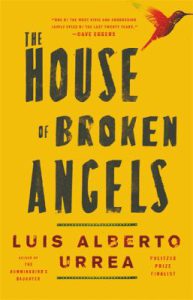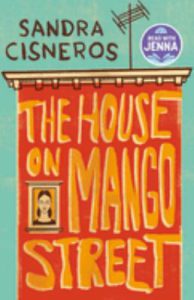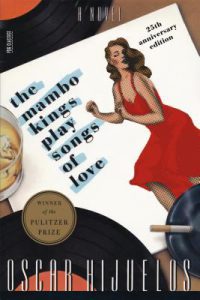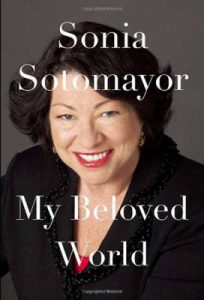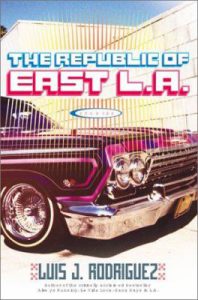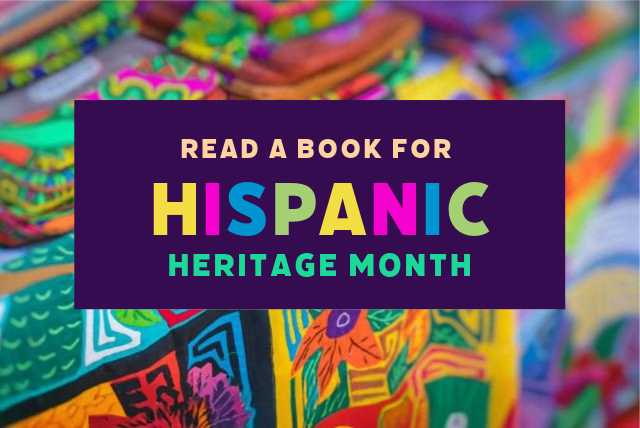
In observance of National Hispanic Heritage Month (September 15-October 15), the RLB Library has compiled a list of books that pay tribute to the contributions of Hispanic Americans to our nation’s culture and history. Here are a few–check them out at the RLB Library!
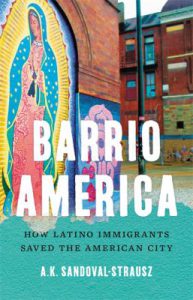 Barrio America by A.K. Sandoval-Strausz.
Barrio America by A.K. Sandoval-Strausz.
“The compelling history of how Latino immigrants revitalized the nation’s cities after decades of disinvestment and white flight. Thirty years ago, most people were ready to give up on American cities. We are commonly told that it was a “creative class” of young professionals who revived a moribund urban America in the 1990s and 2000s. But this stunning reversal owes much more to another, far less visible group: Latino and Latina newcomers. Award-winning historian A. K. Sandoval-Strausz reveals this history by focusing on two barrios: Chicago’s Little Village and Dallas’s Oak Cliff. These neighborhoods lost residents and jobs for decades before Latin American immigration turned them around beginning in the 1970s. As Sandoval-Strausz shows, Latinos made cities dynamic, stable, and safe by purchasing homes, opening businesses, and reviving street life. Barrio America uses vivid oral histories and detailed statistics to show how the great Latino migrations transformed America for the better.” — Provided by publisher.
The House of Broken Angels by Luis Alberto Urrea.
“In Urrea’s exuberant new novel of Mexican-American life, 70-year-old patriarch Big Angel de la Cruz is dying, and he wants to have one last birthday blowout. Unfortunately, his 100-year-old mother, America, dies the week of his party, so funeral and birthday are celebrated one day apart. The entire contentious, riotous de la Cruz clan descends on San Diego for the events. High rollers and college students, prison veternaos and welfare mothers, happy kids and sad old-timers and pinches gringos and all available relatives. Not to mention figurative ghosts of the departed and an unexpected guest with a gun. Taking place over the course of two days, with time out for an extended flashback to Big Angel’s journey from La Paz to San Diego in the 1960s, the narrative follows Big Angel and his extended familia as they air old grievances, initiate new romances, and try to put their relationships in perspective. Of the large cast, standouts include Perla, Big Angel’s wife, the object of his undimmed affection; Little Angel, his half-Anglo half-brother, who strains to remain aloof; and Lalo, his son, trailing a lifetime of bad decisions. Urrea (The Hummingbird’s Daughter) has written a vital, vibrant book about the immigrant experience that is a messy celebration of life’s common joys and sorrows”–Publisher’s weekly.
The House on Mango Street by Sandra Cisneros.
“Readers from all walks of life have fallen for the voice of Esperanza Cordero, growing up in Chicago and inventing for herself who and what she will become. “In English my name means hope,” she says. “In Spanish it means too many letters. It means sadness, it means waiting.”
Told in a series of vignettes—sometimes heartbreaking, sometimes joyous—Cisneros’s masterpiece is a classic story of childhood and self-discovery and one of the greatest neighborhood novels of all time. Like Sinclair Lewis’s Main Street or Toni Morrison’s Sula, it makes a world through people and their voices, and it does so in language that is poetic and direct. This gorgeous coming-of-age novel is a celebration of the power of telling one’s story and of being proud of where you’re from”–Amazon.
The Mambo Kings Play Songs of Love by Oscar Hijuelos.
“It’s 1949 and two young Cuban musicians make their way from Havana to the grand stage of New York City. It is the era of mambo, and the Castillo brothers, workers by day, become stars of the dance halls by night, where their orchestra plays the lush, sensuous, pulsing music that earns them the title of the Mambo Kings. This is their moment of youth, exuberance, love, and freedom―a golden time that decades later is remembered with nostalgia and deep affection.
Hijuelos’s portrait of the Castillo brothers, their families, their fellow musicians and lovers, their triumphs and tragedies, recreates the sights and sounds of an era in music and an unsung moment in American life.
Exuberantly celebrated from the moment it was published in 1989, The Mambo Kings Play Songs of Love won the Pulitzer Prize for Fiction in 1990 (making Hijuelos the first Hispanic recipient of the award). It remains a perennial bestseller, and the story’s themes of cultural fusion and identity are as relevant today as they were over 30 years ago, proving Hijuelos’s novel to be a genuine and timeless classic”–Amazon.
My Beloved World by Sonia Sotomayor.
“An instant American icon–the first Hispanic on the U.S. Supreme Court–tells the story of her life before becoming a judge in an inspiring, surprisingly personal memoir. With startling candor and intimacy, Sonia Sotomayor recounts her life from a Bronx housing project to the federal bench, a progress that is testament to her extraordinary determination and the power of believing in oneself. She writes of her precarious childhood and the refuge she took with her passionately spirited paternal grandmother. She describes her resolve as a young girl to become a lawyer, and how she made this dream become reality: valedictorian of her high school class, summa cum laude at Princeton, Yale Law, prosecutor in the Manhattan D.A.’s office, private practice, federal district judge before the age of forty. She writes about her deeply valued mentors, about her failed marriage, about her cherished family of friends. Through her still-astonished eyes, America’s infinite possibilities are envisioned anew in this … book”– Provided by publisher.
The Republic of East L.A.: stories by Luis J. Rodriguez.
From the award-winning author of Always Running comes a brilliant collection of short stories about life in East Los Angeles. Whether hilariously capturing the voice of a philosophizing limo driver whose dream is to make the most of his rap-metal garage band in “My Ride, My Revolution,” or the monologue-styled rant of a tes-ti-fy-ing! tent revivalist named Ysela in “Oiga,” Rodriguez squeezes humor from the lives of people who are not ready to sacrifice their dreams due to circumstance.
In these stories, Luis J. Rodriguez gives eloquent voice to the neighborhood where he spent many years as a resident, a father, an organizer, and, finally, a writer: a neighborhood that offers more to the world than its appearance allows.
You can find many more books on Hispanic American culture, history, and accomplishments at the RLB Library.
